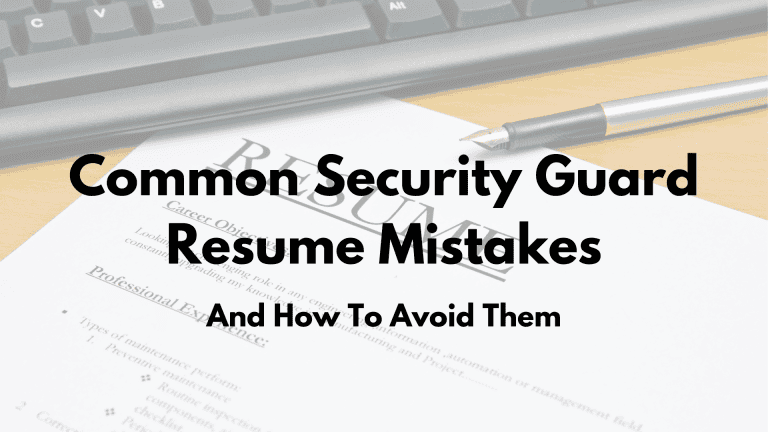Common Security Guard Resume Mistakes

Crafting a strong security guard resume can be challenging.
One of the more common security guard resume mistakes is including too much irrelevant information. It's important to focus on your security experience and skills directly related to the job.
Another mistake is not showcasing your achievements. Employers want to see how you made a difference in past roles. Highlight any awards, commendations, or specific incidents where your actions stood out.
Ensure your resume is clear and professional. Avoid clutter and poor formatting that can turn employers away.
A well-organized resume reflects attention to detail, a critical skill for security guards.
Understanding the Role of a Security Guard
The role of a security guard varies depending on the job and location.
Security guards protect property and ensure safety in places like malls, hospitals, and offices. They monitor activities, prevent theft, and respond to emergencies.
Security guards often check IDs, control access, and watch surveillance cameras. They need strong observation skills and must be good at communicating with the public.
In hospital security, guards help maintain a safe environment for patients, visitors, and staff.
They may deal with aggressive individuals, protect sensitive areas, and ensure the overall safety of the hospital.
There are many types of security jobs available:
- Residential security: Protects homeowners and apartments
- Corporate security: Ensures company property and personnel are safe
- Retail security: Prevents theft in stores and shopping centres
Security guards play a crucial part in maintaining peace and order.
Crafting a Professional Summary
When writing a resume summary for a security guard role, it is essential to emphasize your skills and experience clearly.
Highlighting Relevant Skills
Your professional summary should start by discussing the key skills you bring to the position.
- Use bullet points to list specific abilities, such as:
- Surveillance monitoring
- Emergency response and management
- Conflict resolution
For an entry-level security guard, focus on soft skills like attention to detail and strong communication.
Example:
Proactive and diligent security guard with expertise in surveillance and emergency response. Strong communication skills and a keen eye for detail ensure a safe environment.
Showcasing Work Experience
Include experience that is relevant to the security field. Mention previous job titles and the core duties you carried out in those roles.
For entry-level positions, you can also include internships or volunteer work if relevant.
Example:
Over 3 years of experience as a security officer at XYZ Corporation, responsible for monitoring security cameras and performing regular patrols. Recognized for quick response times and excellent conflict resolution.
Use numbers and specifics whenever possible:
- Patrolled a 50,000 sq ft facility.
- Responded to an average of 5 incidents daily, maintaining a safe and secure environment for over 500 employees.
Structuring Your Resume Effectively
To make your security guard resume stand out, focus on good formatting and making your resume easy to read. Highlight your work experience in the best possible way and use templates if necessary.
Choosing the Right Formatting
The format of your resume matters.
Use bold headers and bullet points to organize information neatly. Opt for a professional resume template to guide you.
A reverse chronological order is ideal, as it highlights your most recent job first. This helps recruiters see your latest skills and experience quickly.
Include sections for Education, Work Experience, Skills, and Certifications. Make sure each section is clearly labelled.
Avoid using too many fonts or colours. Stick with easy-to-read fonts like Arial or Times New Roman in 10-12 point size.
Maximizing White Space and Readability
White space makes your resume less cluttered and easier to read. Use margins and spacing wisely to create gaps between sections.
Break up long paragraphs with bullet points. Use short sentences and simple words. Avoid large blocks of text.
This makes it faster for recruiters to find key information.
Keep your resume to one page if possible. Only include the most relevant experience and skills for a security guard position.
These practices help ensure your resume is both professional and easy to navigate. It shows you can present important information clearly and efficiently.
Detailing Educational Background and Certifications
Listing your education and certifications on a security guard resume is key to standing out. Emphasize the completion of mandatory training and relevant courses to show you are qualified.
Listing Relevant Education
Begin with your highest level of education. If you have a high school diploma, include it.
For specific roles, courses in criminal justice might be valuable. Universities or colleges in Canada might offer such courses, which can strengthen your resume.
Mention the institution's name, the degree or certificate obtained, and the date of completion. This helps employers see that you meet basic educational requirements.
Organize your education section in a table for clarity:
| Institution | Course/Degree | Date Completed |
|---|---|---|
| ABC High School | High School Diploma | 2018 |
| XYZ College | Criminal Justice | 2020 |
Incorporating Certifications
Certifications validate your skills.
Include certificates like First Aid and CPR from recognized institutions such as the Canadian Red Cross. These show your preparedness for emergencies.
Certificates in loss prevention or advanced security training add value.
Mention the certifying body, course name, and date. For example, “Certified in Loss Prevention by ABC Institute, 2023.”
Use bullet points to list your certifications:
- First Aid – Canadian Red Cross, 2022
- CPR – Canadian Red Cross, 2022
- Retail Loss Prevention – DEF Institute, 2023
- Security Training – ABC Institute, 2021
This organization ensures your qualifications are easily noticed and appreciated by potential employers.
Showcasing Key Security Guard Skills
To make your security guard resume stand out, it's important to highlight both technical and soft skills. Focus on those skills that are most relevant to the industry and essential for the role.
Outlining Technical and Soft Skills
When listing skills, prioritize a mix of technical and soft skills.
Technical skills might include knowledge of surveillance equipment, emergency protocols, and law enforcement procedures.
For instance, mention your ability to operate CCTV systems and use two-way radios for clear communication.
Soft skills are equally important.
Show how you effectively handle disputes and maintain a calm demeanour under pressure.
Leadership skills and customer service skills can also be vital, especially if you manage teams or interact frequently with the public.
Identifying Industry-Specific Skills
Highlight special skills specific to your role in the security field.
If you work in a corporate environment, emphasize access control and visitor management.
For those in retail, theft prevention and crowd control are key.
Include any certifications, such as first aid or fire safety training.
Mention any experience with automated security systems.
Tailor your skills to match the needs of the industry you're applying to, ensuring they align with the job description.
Demonstrating Work Experience and Achievements
Clearly showing your work experience and achievements is key to creating a strong security guard resume. It sets you apart from other candidates and shows potential employers that you have a solid background.
Using Bullet Points to Showcase Responsibilities
Use bullet points to highlight your responsibilities at each job.
Keep each point brief and focus on specific tasks you handled. This makes your resume easy to read and shows you can manage multiple duties.
For example:
- ABC Security Inc.
- Monitored security cameras and conducted regular patrols.
- Responded to alarms and investigated disturbances.
- Maintained detailed logs of daily activities and incidents.
Include military experience if relevant, as it often involves security-related tasks that are highly valued by employers.
Quantifying Success with Metrics
To make your achievements stand out, use metrics to show your impact.
Numbers and data provide clear evidence of your success in past roles.
For example:
- Reduced theft incidents by 25% within six months at XYZ Mall.
- Trained and supervised a team of 10 security personnel.
- Conducted 200 safety inspections per month with a 99% compliance rate.
Mention the company name where you achieved these results to give more context.
Quantifying your success helps employers see the value you can bring to their team.
Tailoring Your Resume for the Security Industry
Creating a resume for the security industry requires attention to job descriptions and the use of industry-specific keywords. Focus on elements like security regulations, crime prevention, and emergency response.
Customizing Content for Job Descriptions
Read job descriptions carefully. Each security job may focus on different areas such as access control, surveillance cameras, or cybersecurity.
Adjust your resume to highlight your experience in these areas.
Use bullet points to list your relevant skills and experiences.
This makes it easier for hiring managers to see your qualifications quickly.
Highlight specific duties. If you have experience with metal detectors, detail your proficiency.
The same goes for emergency response and safety protocols. Tailor each section to match the job description.
Mention certifications or training related to security regulations or crime prevention.
This shows that you are well-versed in the necessary skills and regulations.
Avoid generic language. Instead of saying you “worked as a security guard,” specify your role in access control or crime prevention.
Employing Industry Keywords
Research the right keywords. Keywords like emergency response, security regulations, and cybersecurity are essential.
Look at job postings for common terms and include them in your resume.
Integrate keywords naturally. Don’t just list them. Make sure they fit within the context of your experience and skills.
Emphasize your technical skills. If you have experience with surveillance cameras or metal detectors, mention it.
Include software proficiency. If applicable, note any experience with security-related software or systems.
Highlight soft skills. Include keywords such as attention to detail and problem-solving. These are important in safety and security roles.
Avoiding Common Resume Pitfalls
Creating a standout security guard resume involves being precise and free from errors. You should also understand how to use applicant tracking systems (ATS) effectively.
Irrelevant Information and Errors
To make your resume appealing, avoid including irrelevant details. Focus on your skills and experience related to security work.
Irrelevant information can distract employers and reduce the impact of your qualifications.
List your work history in reverse chronological order. Start with your most recent job and work backwards. This helps hiring managers quickly see your recent experience.
Check for spelling and grammar mistakes. They can make you seem careless.
Use tools like spell check or ask someone to review your resume. Small errors can make a big difference.
Use simple fonts like Arial or Times New Roman. Avoid decorative fonts which can be hard to read. Keep the format clean and easy to understand.
Incorrect Use of Applicant Tracking Systems
Many companies use ATS to screen resumes. To get past these systems, use keywords from the job description in your resume.
This helps your resume rank higher in the system.
Don’t include images or complex graphics. ATS can’t read them, and it might mess up the formatting.
Stick to plain text to ensure everything is readable.
Use standard section headers like “Experience” and “Education”. Special or creative headers might not be recognized by ATS, causing important information to be missed.
When listing your skills, use a bullet-point format. This makes it easy for both ATS and hiring managers to see what you bring to the table.
Make sure all dates are correctly formatted in a consistent way.
Finalizing Your Security Guard Resume
Carefully finalizing your security guard resume can help you stand out to potential employers. Pay special attention to error-free content and selecting the right file format when sending your resume.
Proofreading and Reviewing
Proofreading your resume is essential. Check for spelling and grammar mistakes in all sections, including job titles and descriptions.
Make sure that your contact information is current and correct. An error in your phone number or email can prevent employers from reaching you.
It's also important to review resume samples and examples to ensure your content is clear and professional.
Look for common mistakes like inconsistent formatting or missing job locations. Reading your resume out loud can help catch awkward sentences or errors.
Ask a friend or family member to review your resume as well. A fresh set of eyes can often spot mistakes you missed.
Always keep your resume clean and uncluttered.
Choosing the Appropriate File Format
Selecting the appropriate file format is crucial. Employers often prefer receiving resumes in PDF format, as it preserves your formatting across different devices.
This ensures that your resume looks the same on their end as it does on yours.
When saving your resume, use a clear and simple file name, like YourName_SecurityGuardResume.pdf.
Avoid names like resume_final or MyResume as these can be confusing.
Always double-check the job posting for any specific instructions about file format. Some employers might ask for a Word document or another format.
Being vigilant about these details shows you can follow instructions, which is an important trait for a security guard.
Composing a Complementary Cover Letter
A cover letter can boost your chances of getting a call for a job interview. It introduces you and explains why you're the right fit for the position. Make sure to keep it short and to the point.
Start with a Professional Greeting
Address the letter to the hiring manager if possible. If you don't know their name, use “Dear Hiring Manager“.
Clearly State Your Intent
Mention the job you are applying for and where you found the listing. For example, “I am writing to apply for the Security Guard position at ABC Company, which I found on your website.“
Highlight Relevant Skills and Experience
Talk about your skills and experience that match the job requirements.
For entry-level positions, focus on any training, certifications, or volunteer work that relates to security. Use bullet points for easy reading:
- Certified in First Aid and CPR
- Completed Security Guard training course
- Experience in customer service roles
Explain Why You’re a Good Fit
Mention specific reasons why you would excel in the role. For instance, “I have strong attention to detail and can remain calm under pressure.”
Close with a Call to Action
End your letter by inviting the hiring manager to contact you for an interview. For example, “I look forward to the opportunity to discuss how my skills can contribute to your team. Please feel free to contact me at your earliest convenience.”
Use a Professional Closing
Sign off with a simple “Sincerely,” followed by your name.
Frequently Asked Questions
Learn how to avoid common resume mistakes, present yourself even if you're inexperienced, and highlight key skills and elements effectively.
What are common errors to avoid when crafting a resume for a security guard position?
Avoid spelling and grammar mistakes. Make sure your contact information is current.
Don't list unnecessary personal details like age or marital status. Overusing buzzwords can be harmful. Staying clear is critical.
How should a security guard with no experience present themselves in their resume?
Highlight any relevant experience like volunteer work or customer service.
Focus on transferable skills such as communication and problem-solving. Stress your enthusiasm and willingness to learn. Tailor your resume to show your fit for the role.
What elements make a strong summary on a resume for security guard roles?
A strong summary is clear and concise. It should highlight your key skills and any relevant experience.
Include your career goals and how you can contribute to the employer’s security needs. Keep it to 3-4 sentences.
Which skills are crucial to highlight on a security guard's resume?
Emphasize skills like attention to detail, physical fitness, and knowledge of security procedures.
Mention any certifications like First Aid or CPR. Communication skills and the ability to remain calm under pressure are also important.
How can I effectively format a security guard resume to make a strong impression?
Use a clean and simple layout. Stick to one font and avoid colours.
Keep your sections clearly divided: summary, skills, experience, and education. Use bullet points for easy reading. Make important information stand out.
What are typical pitfalls in security guard resumes that can lead to them being overlooked by employers?
Generic resumes that are not tailored to the job can be ignored. Listing too much irrelevant information can distract employers.
Not quantifying achievements or leaving gaps in employment can raise red flags. Always proofread to avoid errors.
Last Updated on Sep 30, 2024





